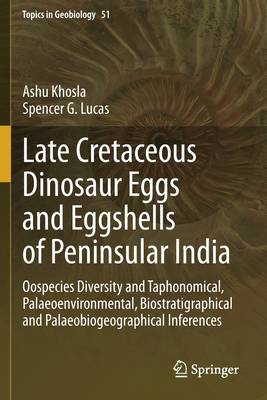
- Retrait gratuit dans votre magasin Club
- 7.000.000 titres dans notre catalogue
- Payer en toute sécurité
- Toujours un magasin près de chez vous
- Retrait gratuit dans votre magasin Club
- 7.000.0000 titres dans notre catalogue
- Payer en toute sécurité
- Toujours un magasin près de chez vous
Late Cretaceous Dinosaur Eggs and Eggshells of Peninsular India
Oospecies Diversity and Taphonomical, Palaeoenvironmental, Biostratigraphical and Palaeobiogeographical Inferences
Ashu Khosla, Spencer G LucasDescription
This book documents analyses of the Late Cretaceous dinosaur nesting sites of the Lameta Formation at Jabalpur, Districts Dhar and Jhabua, Madhya Pradesh; Districts Kheda and Panchmahal (Gujarat); and the Pisdura, Dongargaon and Pavna sectors in the Chandrapur Districts of Maharashtra, which are exposed in India along an east-west and central axis. In this work, special emphasis has been given to the dinosaur nesting sites of the east-central Narbada River region, including its regional geology. The work was undertaken to provide detailed information concerning dinosaur eggs, eggshell fragments, nests and clutches found in the Lameta Formation of peninsular India. Prior to the present work there had been no detailed review of systematic work on the taxonomy, and of micro- and ultrastructural studies of dinosaur eggs and eggshells from the Lameta Formation.
The study documents the field and laboratory investigations that facilitated the reconstruction of the morphotaxonomy, models for the burial pattern of eggs and eggshells, taphonomic implications, and the palaeoenvironmental context and palaeoecological conditions during the Late Cretaceous at the time of the extrusion of the Deccan traps, which may have been partly responsible for the extinction of the dinosaurs. The need to follow a parataxonomic classification for Indian dinosaur eggs and eggshell types is very apparent, and this book addresses this aspect in some detail. The emphasis on the application of parataxonomic schemes is based on the description of new oospecies and their comparison with previously known forms. The present work has led to the recovery of numerous nests, many collapsed eggs and hundreds of dinosaur eggshell fragments from the localities situated near the east, west and central Narbada River regions. It will be of interest to academics and professional palaeontologists, and all students of dinosaurs.
Spécifications
Parties prenantes
- Auteur(s) :
- Editeur:
Contenu
- Nombre de pages :
- 280
- Langue:
- Anglais
- Collection :
- Tome:
- n° 51
Caractéristiques
- EAN:
- 9783030564568
- Date de parution :
- 22-10-21
- Format:
- Livre broché
- Format numérique:
- Trade paperback (VS)
- Dimensions :
- 156 mm x 234 mm
- Poids :
- 426 g

Les avis
Nous publions uniquement les avis qui respectent les conditions requises. Consultez nos conditions pour les avis.






